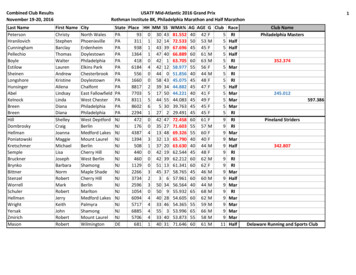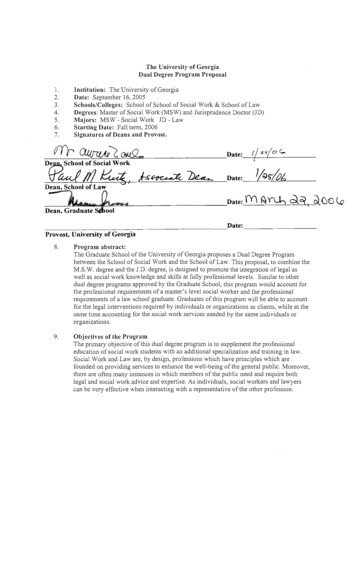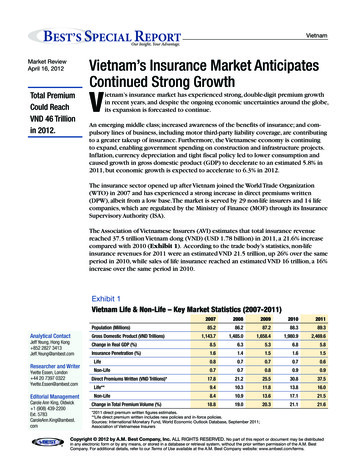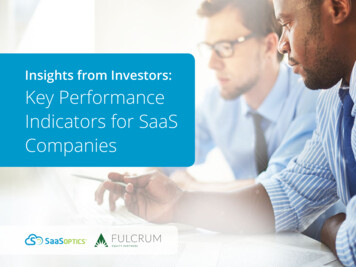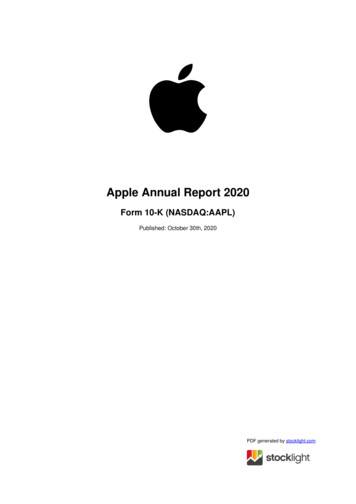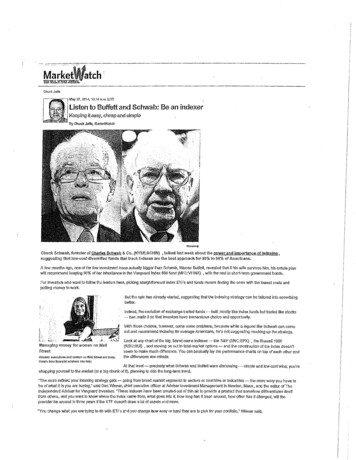
Transcription
Marke'!'JlRW,\ll.l!ll!IBJ'Chud;Ja!fe-1May27,2014, 10:14 a.m, EDT,: 1·Listen to Buffett and Schwab: Be an indexer· Keepingiteasy 1 cheapandsimple.By Chuck Jaffe, MarketWatchEiloOrnborgChuc:I Schwab1 founder of Charles Schwab & Co. {NYSE:SCHW} , talked last week about the power and importance of Indexingsuggesting that row-cost·dlversif!ed funds that track indexes are the best approach for 95% to 98''/o of Americans,1A few months ago, one of the few investment icons actually bigger than Schwab, Warren Buffett, revealed that If his wife survives him, his esfate planwl!I recommend keeping 90% of her inheritance In the Vanguard Index 500 fund (MFD:VFINX) , wfth the rest In short-term government bonds.For Investors who want to follow-the leaders here, picking straigh1forward index ETFs and funds means finding the ones with the lowest costs andputtlng money to workBut the spfn has already star led, suggesting that the indexing strategy can be tailored into somethingbetter.Indeed, the evolution of exchange-traded funds - built mostly like index funds but traded like stocks- has made it so that Investors have tremendous choice and opportunity.ViJith those choices, however, come some problems, because While a legend like Schwab can comeout and recommend indexing J'.or average Americans, he's not suggesting mucking up the strategy.Managing money for women on WallStreet\l\lornen executives and womon on Wal! Streetar(l busy.Here's how financial advfsers cen help.Look at any chart of the big, brand-name indexes- the S&P (SNC:SPX) , the Russel! 1000(RSU:RUI) , and moving on out to total-market options- and the construcllon of the Index doesn'tseem lo make much difference. You can basically lay the performance charts on top of each other andthe differences are minute.At that !eve!- precisely what Schwab and Buffett were discussing - simple andstrapping yourself to the marl et {or a blg chunk of it), planning to n'de the long-term trend.low cost wins;you're"The more refined your indexing strategy gets - going from broad market segments to sectors or countries or industries - the more wary you have tobe of what it rs you are buying," b-aid Dan Wener, chief executive officer at Adviser Investment Management in Newton, Mass., and the editor of TheIndependent Adviser for Vanguard Investors. "These indexes have been created out of thin air to provide a product that somehow differentiates Itselffrom others, and you want to know Where the Index came from, what goes into it, how long has 1t been around, how often has lt changed, wlll theprovider be around in three years 1fthe ETF doesn't draw a lot of assets and more."You change what you are trying to do wllh ETFs and you change how easy or hard they are to pick for your portfolio," Wiener sa!d.
/V'NMarketWatchVanguard founder Jack Bogie's advice tofretful investors: Shut your eyes and letindexes do the workBy Chuck JaffePublished: Nov 3, 2014 2:07 p.m. ETBloombergJohn C. Bogle, founder of the Vanguard Group.If the stock market's September October flip-flop scared you, Jack Bogle has some advice on how totackle what's about to happen next: Close your eyes.Bogle, the founder of the Vanguard Group, the world's largest investment company, and patron saint oflow-cost, long-term index investing, has not changed his tune in the 40-plus years since he started thecompany.At age 85, Bogie's not about to change his ways now. And not because he's past learning new tricks oradjusting his thinking, but because decades of being right have created an unshakable courage in hisconvictions.
Many of his disciples share Bogie's audacity, but he laments the financial fortunes of all the people whohaven't gotten the message yet.This week, Bogle did a two-part interview (listen here and here) on my radio show, "MoneyLife withChuck Jaffe," and while he did not break much new ground, it's always worth plowing important territorywith someone who knows the lay of the land. Here are some highlights:On markets:"What's going on in the market is domination of short-term· speculation over long-term investment," hesaid. "Long-term investors simply are not affected by the comings and goings of the market, where itlooks like it goes up 100 points on odd-numbered days and down 100 points on even-numbered days."As I have said before, the daily machinations of the stock market are like a tale told by an idiot, full ofsound and fury, signifying nothing," Bogle added. "One of my favorite rules is 'Don't peek.' Don't let allthe noise drown out your common sense and your wisdom. Just try not to pay that much attention,because it will have no effect whatsoever, categorically, on your lifetime investment returns."On why investors should ignore the noise and just aim for the index return over a lifetime:"Returns are created not by the stock market, they are created by U.S. business, our corporations," heexplained. 'The formula I use for that is today's dividend yield, which is around 2%, and the subsequentearnings growth which could be around 5% - we're not sure but that's probably not a bad guess -andthat's a 7% nominal rate of return on stock in terms offundamentals."If you go back and look at the history of American business over the last century, you will find the[price/earnings] effect of stocks is zero. All of the returns are created as investment returns, dividendyields and earnings growth, and pie effect -the speculative return -goes up and goes down and goesup and down for 100 years and ends up just where it started."So try to ignore these machinations and stick with getting the underlying returns that provide stocks asgood investments," Bogle said.On how many experts have declared indexing the winner over active management:"This year, 2014, so far happens to be one of the great years for S&P 500 indexing. I hope nobody thinksit will be that way forever because it won't be."I am sorry to say it, fellow shareholders, but it doesn't get that good. Over the long run [indexing] shouldbeat the competition by 150 to 200 [1.5% to 2.0%]," Bogle said. "Confidence in the mathematics -therelentless rules of humble arithmetic- enables you to get through . "On how bond investors should look at the potential for interest rates to rise (several years ago,Bogle warned of a building bond bubble):
"When you talk about bond investors getting hurt when bond yields start to rise, the answer to that isreally yes and no. Certainly yes, absolutely, on a short-term basis, but you shouldn't be investing inbonds on a short-term basis."Use the intermediate maturity around 10 years exemplified by the high-quality 10-year U.S. Treasurynote," he added. "Basically today you are entering into a contract with the Treasury to give you 2.2%every year for the next 10 years. The Treasury will be good for that; there's no risk in that deal fallingapart that I can see. The price of that Treasury [note] will drop a lot if rates will go up, however if you arereinvesting your income, you will have a higher total return over the 10-year period. So in a certainrespect if you can stand the pain, we all should want rates to go up."On exchange-traded funds:"They're fine just so long as you don't trade them," Bogle said. "It's the ability to trade that distinguishesthem [from a traditional index fund], and then there is the kind of Looney Tune section of the ETF marketpursuing things that no investor should ever do . Anybody who plays that kind of game [using leveragedor niche products] is a damned fool."The ETF is the greatest marketing innovation of the 21st century so far. Whether it's the greatestinvestment innovation of the 21st century so far, I can't imagine. I think it's counter-productive."Advice for investors who can't be satisfied with shutting their eyes, doing nothing and lettingindexing work In their favor:"Divide your money into your Jong-term investment account and your funny money account for short-termspeculation. Guess on funds, guess on markets, guess on stocks if you want to, because that gives youan opportunity to act on your speculative impulses.But they will hurt you a lot so I recommend you have a funny money account of no more than 5% of yourportfolio. I also recommend that after five years, check it out Has it done better than the long-terminvestment or worse? I'd be astonished if at least 95% of those funny money accounts don't do worse."
Index funds superior to high-priced active management- MarketWatchPage 1 of2Invest smarter!Trusted, influential analysis for 90 yearsMarketY/atch11llillll1Slll1EfJXJRfilAug. 1, 2014, 5;00 a.m. EDTIndex funds superior to high-priced active management,,By George SistiEditor's note: As a financial planner, George Sisti advocates index investing and has wrltte n passionately on the subject for TheRetlreMentors, Investor Robert fsbitts, however, feels actively-managed funds are much maligned and have a place in your retirementportfolio. Read his take hero.The fheoretica! benefits of active management have proven to be fables. So why are investors still paying high fees for dlsappo!nUng, Inconsistent andtax Inefficient performance?It's long bean my contenUon that !he two primary components of active management - market timing and stock picking - are modem day equfvalentsof alchemy, the pursuit of an lllusion.Index investors believe that the stock market is "efficient: This means that today's stock prices represent the consensus opinion of many smart people,incorporate all known information about a company and its prospects and will instantly adjust to new Information. The market's consensus opinion isn't aperfect pricing mechanism but if has been awfully d!fficu!t to outsmart.ProvJders of active management disagree. Some would have you believe that they can find and profit from mispriced securities. Others claim to have 1heability to time the market, shifting between stocks and fixed income assets to avoid market dec!!nes. An ab!llty to !!me the market has been, andcontinues to be, significantly overstated by many self.promoting money managers.It Js difficult to predict the long-term prospects of any company in !he fast·changing global economy. A company's stock price will change as marketparticipants respond lo random and unpredictable new information. This "random walk" hypothesis was made famous by Burton MalkieJ ln hisinvestment classic, A Random Walk Down Wall Street- required reading for all do-it-yourself investors. Unfortunately, most Investors haven't read thebook and are unaware of the poor track record of active mana{lement.Any stock mispric1ng disappears as soon as it becomes known; making stock picking a short-term strategy. Stock pickers believe that they can outsmartthe collective pricing judgment of an other market participants. It's as if the playground bully challenged everyone tn school to a fight, not one at a time,bu! all at once. I can't thlnk of a better analogy to explain !he disappointing track record of stock pickers and why few have created value in excess ofthek fees.So why are more than 85% of mutua! fund assets invested in actively managed funds? One reason might be that many investors lack financial !ileracyand are Influenced by fund advertising or the conflicted advice of commlssion based financial advisers. But do financially literate Investors make betterInvestment decisions than the average investor?A recent study, Financial Literacy and Mutual Fund Investments: Who BuysAcUve!v Managed Funds? interviewed more than 3,000 mutual fundinvestors and tracked the performance of their actively managed equity funds from May 2006 through May 2008.The authors discovered a positive relationship between financial literacy and the likelihood that an investor would be aware of, and implement an indexInvestment strategy. However, the majority of even the most sophisticated Investors Invested primarily in actively managed funds, Unfortunately, theperformance of the funds chosen by financially literate Investors did not yield a higher risk adjusted return than those chosen by less sophisticatedinvestors.One question in the survey was designed to measure a respondent's self-assessed "Better Than Average" (BTA} score:"On average I am able to select securities which deflver superior returns compared to those securities selected by a typical investor."There were five multiple-choice answers ranging from "strongly disagree" to "strongly agree". Survey participants w!th high BTA scores tended to beaffluent, have above-average financial literacy and overestimate their ability to find outperforming actively-managed funds -what the authors call the"overconfidence phenomenon":"Overconfidence is a possible explanation tor why even highly sophistfcated pattic/panls mostly select active funds . , We see that investors who arefinancially more literate believe themselves to be better than average in their fund choices. Apparently they are not."There was also some evidence that sophisticated investors tend to buy funds that have recently performed well - adding recency bias and performancechasing to thelr overconfidence.Financially literate investors tended to avoid mutual funds with sales loads. However, !fa fund had good recent performance, they were likely to ignorehigh management fees even though high management fees create a greater long-term performance drag than a one·time, front.end sales load.The Pied Piper of active management leads investors into a Twilight Zone of short-term speculatlon. It's an eerie world of greed, graphs, datamassaging and half.iruths; where !he unwary are separated from !heir money.
Index funds superior to high-priced active management - MarketWatchPage 2 of2Investors would do well to follow this advice from Warren BuffettttMost investors. both institutional and individual, will find that the best way to own common stocks is througb an Index fund that charges minimal fees.Those following this path are sure to beat the net results (after fees and expenses) delivered by the great majority of investment professionals."Wealth accumulation is best accompllshed by owning a prudent allocation of low-cost stock index funds for the !ong-term, Mix in some common sense,patience, and rebalancing. And please, stay far away from the aclive management Twilight Zone, where alchemists pursue illusions.'Index funds beat active 90% of the time.' Really?\Nhack-a-mole fund managers can't beat index fundsWarren Buffett to heirs: Put my es1ale in index fundsMore from The RetlreMeo!ors Cop)'f(!lht 2014 Morke\!A'l lot . 1no. AH rlnM roa rved.Byuilnp this fte, you agroelolhe Term ofSat'lloe, P O,.noy Polley, andCoo ie Pollo)'.Intra day Data picM -Od b)'S1X: Financlol lnfo malion and aubjoot! temis or u e. Histork I and curr nt end.of-day data providod by stx Flnanclal lnf rmati011. lnU-aday data tl&layud p r fll chan9e requlremonl . SS.f'IDowJoni lndlcoo (SM) fromDow Jons & company, !no. A!I quole are In loe !I exohan e tima. Ra Hlm laot I dola p1t111ided by t./ASOAQ More blormaUon on NASDAQ tracl d symbol and !heir """en! financial 1a1U . !nlraday dola dolayad 15 minutes fo No;d q. nd 20 min11l fOf olher e «:banges. Si P/Dow Jone Indio (SM)(rom Dnw Jones & Company, lnc. SEHK lnltaday dala I f IOYl ! d bJ SlX Flllanoial lofotrnollon snd ); all \ 60·rnlnules delayed- All quotes arc in looal ex.:hangclim .'.1 ,t.;0/1/'1fl1A
.' ';Pensionmance h1 ejgbt of the last 10years. The combmatlon ofreduced costs and higher returns IB the proverbial vl.h1win for county residentse1:hployees, and retirees. 'Governments have an obli- ·.@ gation to be careful stewards of the public's :rllon.ey.If higher-fee, actively manJosh Shapiroaged investments do notconsistently ou!perfonn theJosh !iili11piromarke we should not enfees fuan activelyis the Montgomery Countytrust public ftmds to 1h8l1J.managed funds, and assetcommissioners chairman and'l\vo Pcinnsylvlinia fundsD1llnagers rarely beat theserves as chairman of thethe State Employees' Remarketoverthelongrun.·county's pension boardtirement System (SERS)Therefore, shifting from.and the Publichentrying!oparebudhigher-cost, lower-perform-·' School Employees'gets and be lllDre effi- , ing, activelymanagedinvest·Retirement Syscien go where theinents to lowe1,cost, bighertem (PSERS) - ·., performing, passively manmoney ls,are substantially inThat's why Montgomery - aged index funds 'will savevested in hlghe1'County; the commonwealth'sgovemments in Pennsylvaw 'cost.investmentve-.thltd most ,populous county,11!'1. and atound !he countryhicles such as.priclosely exarmned the costs assobillions of taxjlayer dollars.vate equity, vendated with our 450 millionAfter a thorough reviewture capital, real esof. our county's public-penpublic employee. pension fund.tate, and hedgePublic pensions are an area ofsion fund performancefunds. In fact, the,.signjficant potential savingsand fees .over many yearnand of parl:icularLrnportancefuour pension board recentJYtwo funds eachpay about 1 perstate fu"ld local governments · voted to move 90 percent ofmuund the coll!11:Ff. .,our pension-fund assets to '1c n (or total of about 770million) m manager fees, a. Pennsylvania's funds have aportfolio offered .by Vanmte seven times highershortfal,1 of 41. billion, and!P"ard, a ValieyForge-based,than Montgomery Countysome otl1er states )lave Jiabilimvestor-owned frrm with!"es even highe1, Unless therehundreds of employees in 011 be paying for its diversiIS. another sqlutionJ t]lese E! hgrtour COill1tY, It is importantfied Vanguard mutual fundllneup and 20 times higherfalis will'ultimately need toto note that lhe county's rebe filled by diverting fundsfanned procurement pro an those funds would payftom valuable invesimentscess requires companies to!f ille co onwealfu simplymvested m an S&P 500 fulike education, by ralsingdisclose any financia;l or podex fm1d,tmres, by bortowing morelitical dealings they mayThe PSERS fund eamedmoney, or a combination ofhave had wilh county offiabout 1Z percent on its inall .lhree. ·cials. Vanguard had none.vestments in 2012 co.mWhile so-ailled pension re'I'his shift will reduce thepared wifu the S&P soo refonn is the subject of muchfund's management-fee exturn of 16 percent. For thatdebate, fuere should be onepenses by more than two- ·year alone fue pension fundpublic-pension issue uponthirds, sav.ings of morewould have been better offwbich everybody cim agree:fhru1 1 million annually.by about 1.25 billion if itfue costs of managing penThe switch also enableswas solely invested in thesi?n assets: Unfortunately,the cotlnty to eliminate oneS&P. Even. if the actively s was absent from Gov.consulting firm ·and moremanaged funds hadCorbetfs r ceut .proposal.than a dozen asset managmatched !he retums of fueTl}e goal of 8!1 as-. ,ers. 'Theco111binationoflowpassive fimds) the savingsset ager IS er manage1nBnt fees andmfees would still have been ax:rmze. portfoliolowei· pe.rso11nel costs gi\reEhundreds of millions of dolreturns. The corr;the passively managedlars.P ":ents of maxifunds at least a full percentOf course, there will stillllllZlllg retnrns areage-point advantage on albe ups and downs in lhetwofold: fees andternative :investments. Plus,market And, as we'-ve re perfo1111ance. ;:tiefrom a performance per- . entlyseen, down times canreco d ls clear thatspective, fue S&P index hadbe veiy painful. But, over ·pas 1 !--" E: ,:-1,;beaten Olli' activ':"llY man-·the Jong haul, the overall ;nrn:ui fnni!'.c:: l'lnn11 l nei:'forrna't"lri:it h Q n imnrP:.G ive !reforms.Wlll"'WlllWf.?f b?ut 9.85 percent sinceits Inception m1926. .Real pension reform withlower fees and higher perfo11nance - tirat :is fue approach we've taken in l\lfontgomery Counl:y and I strongly suggest that Pennsylvaniafollow suitE-mail Josh Shapiroat Josh@montcopa.org, orfollow hlrJ.\ on Twitter at@Josh sh'aplro,-
The Decline and Fall of Fund Managers - MoneyBeat - WSJPage 1 of3THE WALL STREET JOURNAL.WSJ.oomAugust 22, 2014, 2:10
Marke '!'JlRW,\ll.l!ll!IBJ' Chud;Ja!fe -1May27,2014, 10:14 a.m, EDT ,: 1· Listen to Buffett and Schwab: Be an indexer · Keepingiteasy 1 cheapandsimple . By Chuck Jaffe, MarketWatch EiloOrnborg Chuc:I Schwab1 founder of Charles Schwab & Co. {NYSE:SCHW} , talked last week about the power and importance of Indexing 1 suggesting that row-c

